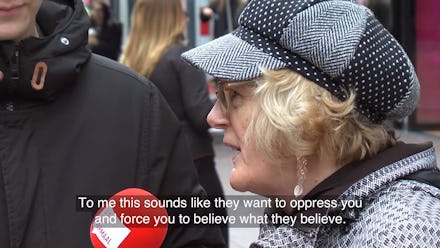Viral Video Shows What Happens When You Show People a Bible With a Quran's Cover on It

In the wake of extremist attacks like the one that rocked San Bernardino, California, on Wednesday, some people are quick to condemn Islam as dangerous. But it turns out if you simply swap the covers of the Bible and the Quran, people can't necessarily tell the difference between the passages of both that endorse violence.
Filmmakers Sacha Harland and Alexander Spoor, producers of the Holland-based YouTube channel Dit Is Normaal, replaced the cover of a Bible with one of the Quran and highlighted some of the holy book's most objectionable passages (such as Leviticus 20:13, which commands believers to put gays to death).
They then told random people on the street to read the highlighted sections of the Bible, telling them it was indeed a Quran. The results were illuminating — not knowing it was a Christian book they were reading, the passersby condemned the brutal commandments.
"If you've been raised with this book and these kind of thoughts it's going to influence the way you think," one man said.
Another woman commented, "To me, this sounds like they want to oppress you and force you to believe what they believe."
"Most of our people have experienced the freedom to make their own choices and freedom of speech, and having that freedom allows you to think differently," said another man.
It's yet another reminder that extremists wishing to do harm can find justification for their actions in any book.
However, as the Atlantic's Caner K. Dagli wrote in February, it's also wrong to assume the understanding of what Islam demands of its followers, hawked by terrorist organizations like the Islamic State group, is a literal interpretation of the Quran instead of an ideologically extreme reading.
"Determining what texts 'plainly' say is not as easy as spotting some words on a page," Dagli writes. "Islam's interpretative tradition exists because the differences between plain and hidden, elliptical and direct, absolute and qualified, are not always obvious."
h/t Huffington Post